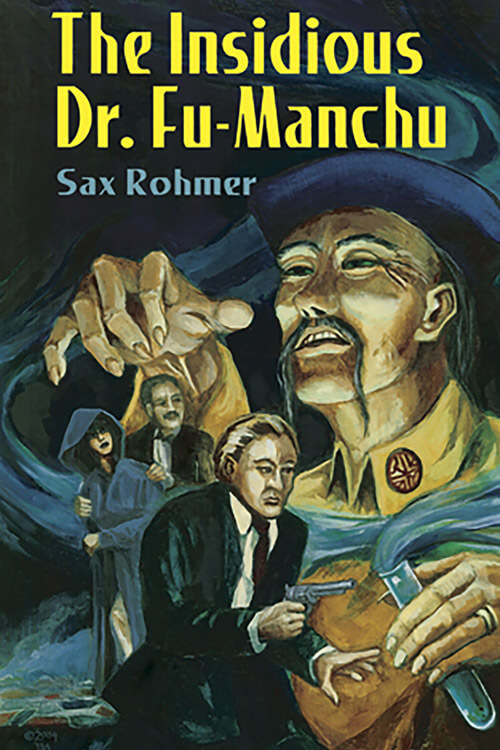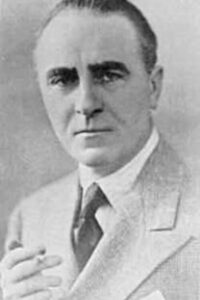
The Insidious Dr. Fu Manchu
Petrie, I have travelled from Burma not in the interests of the British Government merely but in the interests of the entire white race, and I honestly believe— though I pray I may be wrong—that its survival depends largely upon the success of my mission.”
To say that I was perplexed conveys no idea of the mental chaos created by these extraordinary statements, for Nayland Smith had brought fantasy of the wildest into my humdrum suburban life. I did not know what to think or what to believe.
“I am wasting precious time!” he rapped decisively, and, draining his glass, he stood up. “I came straight to you because you are the only man I can trust. Except for the big chief at headquarters, you are the only person in England, I hope, who knows that Nayland Smith has quit Burma. I must have someone with me, Petrie, all the time—it’s imperative!
Can you put me up here and spare a few days to the strangest business, I promise you, that ever was recorded in fact or fiction?”
I agreed readily enough, for, unfortunately, my professional duties were not onerous.
“Good man!” he cried, wringing my hand impetuously. “We start now.”
“What, tonight?
“Tonight! I had thought of turning it in. I have not dared to sleep for forty-eight hours except in fifteen-minute stretches. But there is one move that must be made tonight and immediately. I must warn Sir Crichton Davey.”
“Sir Crichton Davey—of India—” “Petrie, he is a doomed man! Unless he follows my instructions without question or hesitation, nothing can save him before Heaven! I do not know when the blow will fall, how it will fall, nor from whence, but I know that my first duty is to warn him. Let us walk down to the common corner and get a taxi.”
How strangely does the adventurous intrude upon the humdrum; for, when it intrudes at all, its intrusion is more often than not sudden and unlooked for. Today, we may seek romance and fail to find it: unsought, it lies in wait for us at the most prosaic corners of life’s highway.
Read or download Book
Sax Rohmer
Arthur Henry “Sarsfield” Ward (15 February 1883 – 1 June 1959), better known as Sax Rohmer, was an English novelist. He is best remembered for his series of novels featuring the master criminal Fu Manchu.
Life and work
Born in Birmingham to working-class Irish parents William Ward (c. 1850–1932), a clerk, and Margaret Mary (1850–1901), Arthur Ward initially pursued a career as a civil servant before concentrating on writing full-time. He worked as a poet, songwriter, and comedy sketch writer for music hall performers before creating the Sax Rohmer persona and pursuing a career writing fiction.
Like his contemporaries Algernon Blackwood and Arthur Machen, Rohmer claimed membership in one of the factions of the Hermetic Order of the Golden Dawn. Rohmer also claimed ties to the Rosicrucians, but the validity of his claims has been questioned. His doctor and family friend Dr R. Watson Councell may have been his only legitimate connection to such organisations.
His first published work was issued in 1903 when the short story “The Mysterious Mummy” was sold to Pearson’s Weekly. Rohmer’s main literary influences seem to have been Edgar Allan Poe, Arthur Conan Doyle, and M. P. Shiel. He gradually transitioned from writing for music hall performers to concentrating on short stories and serials for magazine publication. In 1909 he married Rose Elizabeth Knox. He published his first book Pause! anonymously in 1910. In 1934, Sax Rohmer moved into a newly refurbished house, Little Gatton on Gatton Road, Reigate, Surrey, where he lived until 1946. He died after succumbing to Asian flu in 1959.
After penning Little Tich in 1911 (as a ghostwriter for the music hall entertainer of the same name) he wrote the first Fu Manchu novel, The Mystery of Dr. Fu-Manchu, first published in a serialization from October 1912 to June 1913. It was an immediate success, with its story of Denis Nayland Smith and Dr. Petrie facing the supposed worldwide conspiracy of the “Yellow Peril”. The Fu Manchu stories, together with his more conventional detective series characters — Paul Harley, Gaston Max, Red Kerry, Morris Klaw (an occult detective), and the Crime Magnet — made Rohmer one of the most successful and financially well-off authors of the 1920s and 1930s.
The first three Fu Manchu books were published in the four years between 1913 and 1917, but it was not until 1931 (some 14 years after the third book in the series) that Rohmer returned to the series with Daughter of Fu Manchu. The reason for the long interval was that Rohmer wanted to be rid of the series after The Si-Fan Mysteries. The first three books had been successfully filmed by Stoll in the twenties as a pair of serials.
Rohmer’s first effort at reviving the Fu Manchu property was ultimately reworked as The Emperor of America. The original intent had been for the head of the organization to be Fu Manchu’s daughter. He kept Head Centre as a female criminal mastermind to combat Drake Roscoe but was very unhappy with the book both as it started and in its finished form. He would later return to Drake Roscoe and his female supervillain for the Sumuru series. In the meantime, he tried again to focus his energies on what was first titled Fu Manchu’s Daughter for Collier’s in 1930, but with an older (now knighted) Denis Nayland Smith as the protagonist once more. The results were infinitely better and jump-started the series in the process.
In the 28 years from 1931 to 1959, Rohmer added a further 10 books to the Fu Manchu series, meaning the series totals 13 books in all (not counting the posthumous short story collection The Wrath of Fu Manchu and Other Stories). The Fu Manchu series was criticized by the Chinese government and Chinese communities in the U.S. for what was perceived as negative ethnic stereotyping. Sociologist Virginia Berridge has stated that Rohmer created a false image of London’s Chinese community as crime-ridden, further claiming that the Limehouse Chinese were one of the most law-abiding of London’s ethnic minorities. Critic Jack Adrian has written: “Rohmer’s racism was careless and casual, a mere symptom of his times”. Colin Watson commented: “So vehement and repetitive were Sax Rohmer’s references to Asiatic plotting against ‘white’ civilization that they cannot be explained simply as the frills of melodramatic narration.”






